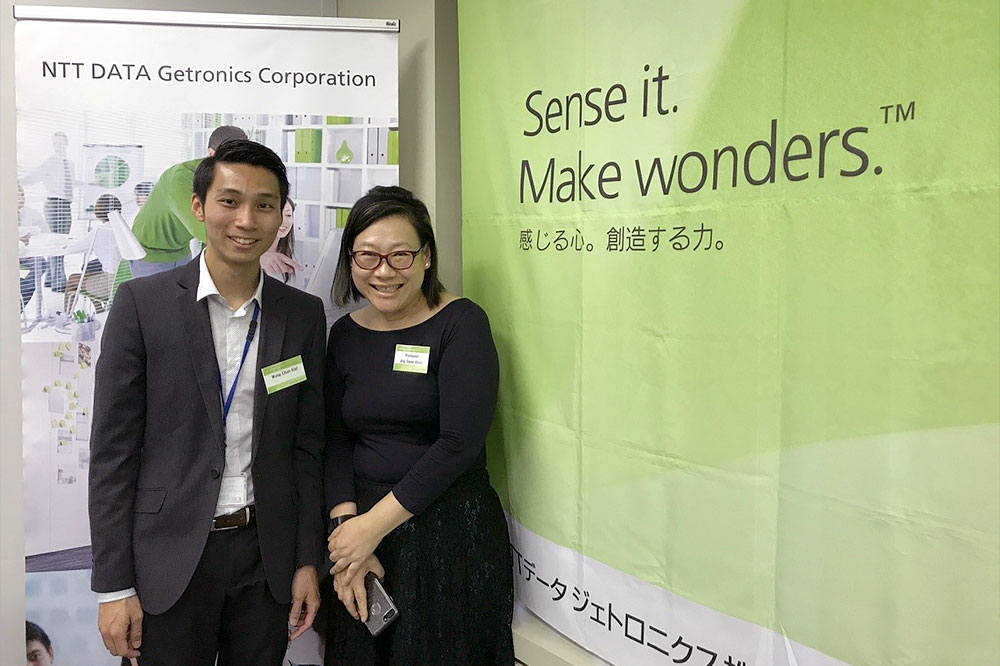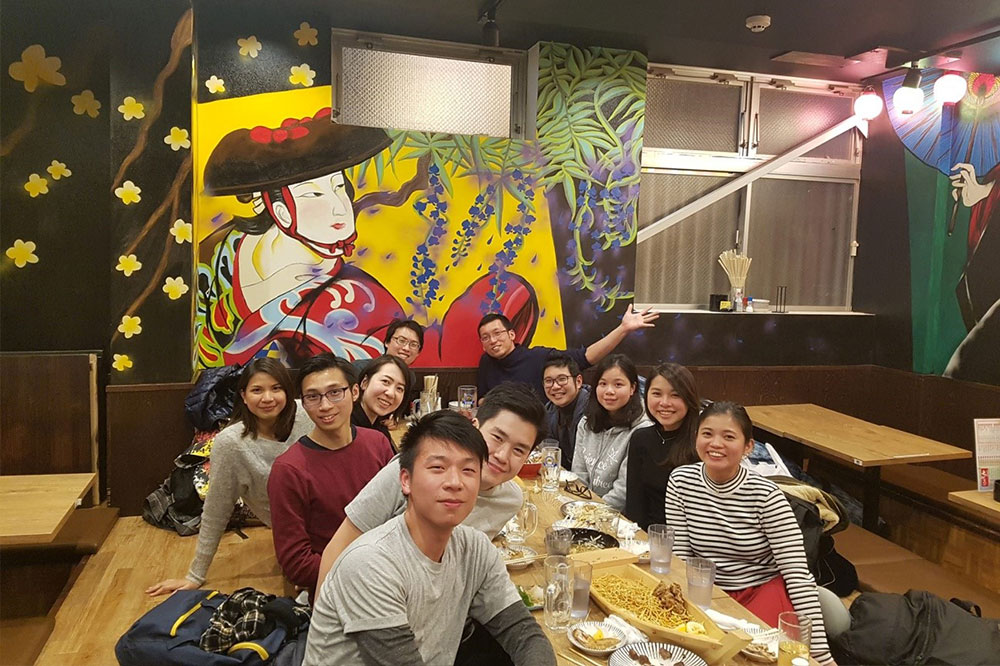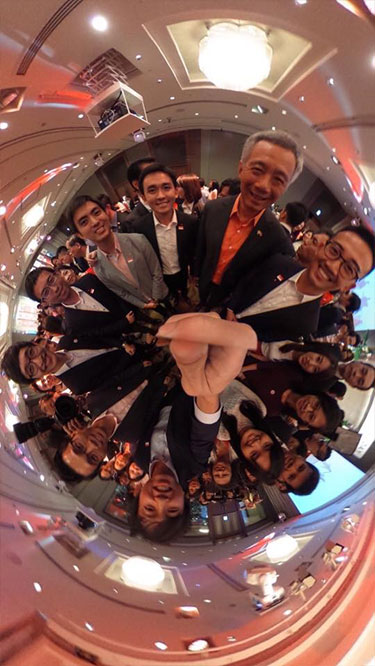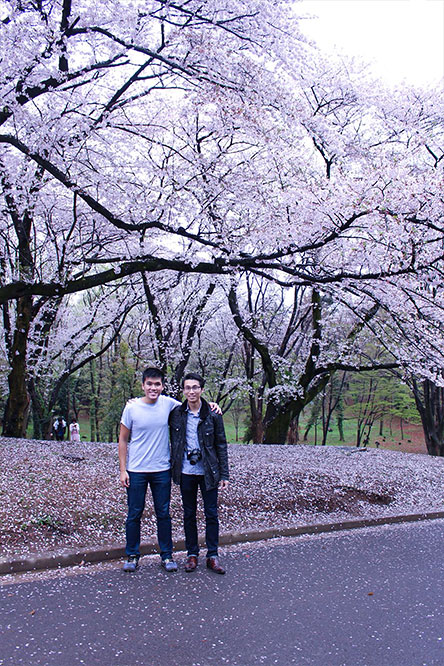NUS BBA alumnus Wong Chun Kiat (class of 2016) who specialised in Management, moved to Japan after graduating. He had secured a job with Japanese Fintech company NTT DATA Getronics. What is it like working overseas so soon after graduation? How did he land this job? Chun Kiat shares with Outside how he planned and secured this role, and what he has picked up so far in Japan.
Q: What am I doing?
I started working in Japan from September 2016 and I am currently a system engineer working at NTT DATA Getronics. Our projects include maintaining the back systems of banks to ensure your daily financial transactions get through without problems. Heard about something called a bank SWIFT code? My journey so far has been working a lot on the SWIFT payment system of a bank. Of course, my role in my team also includes having to deal with English translations.
The next question is why of all jobs I could have chosen, I chose to be a system engineer? Well it is partly due to how things work in Japan and also my choice. In Japan, instead of recruiting for the role and based on ability, companies recruit fresh graduates based on their potential and personality. Roles are assigned after training. Fresh graduates enter companies in batches and usually they do not get to choose their role/do not get their chosen role. The system is quite different from Singapore’s. I was asked to choose between sales and system engineer and I chose the latter because I felt that I lack technical skills and wanted to train myself for it.

Chun Kiat with Assoc Prof Ang Swee Hoon, who was his Field Service Project instructor, at NTT DATA Getronics during a NUS BBA’s Bizad Abroad 2017 trip
Q: How did I get this job?
I started studying Japanese in NUS from my fourth semester as an elective out of interest. However, I grew to really enjoy it and ended up finishing Japanese 6 in my last semester. While I was still studying Japanese 5, a recruiter came to give a talk in my lecture and thereafter I applied for companies in the given list. Having no internship experience, it was not surprising that I received only one reply, which was from my current company. Miraculously, I passed three rounds of interviews in four consecutive days and got the offer.
Q: What are some of the obstacles you have overcome since joining this role?
One major obstacle would undoubtedly be language. All my daily interactions are in Japanese, and I am forced to get out of my comfort zone. I have to write reports, design documents, attend meetings and speak in Japanese. It has been slightly over a year, and while I am still not fluent in Japanese, I believe it is better than when I first entered the company. I can now interact with clients and get my point across albeit in an unnatural way especially to the locals.

Dinner at an izakaya with friends after a ski-trip consisting a few Singaporeans, two Japanese and two Hong Kongers
Q: Besides work, what do you usually do for fun? Typical “salaryman” activities?
Recently, I was invited to do bouldering by my Singaporean friends working in Japan. After a couple of sessions I grew to like it! Actually, working overseas is not unlike working in Singapore. Although I get weekends off, usually I just want to rest after a tiring week. A typical “salaryman” activity is drinking after work (called nomikai). My company does not have a worrisome drinking culture, but I am still obliged to have at least one session a month with my team.
Q: What should one look out for if applying to work overseas?
- Do a thorough research of the company – some companies are not what they present themselves to be. If you understand the country’s language, research it using that language. Sometimes, meanings really do get lost in translations.
- Work culture of a country may just be a stereotype. Try to link up with employees of the company and talk to them to find out more about the culture and challenges. Nevertheless, you will also need to be prepared to adapt to a new culture.
- As with any job, you should always double check the remuneration and benefits and be sure that you are willing to accept them before deciding.
- Read up on the labour laws of the country you are intending to go work in. Know how your taxes are deducted, whether you have to pay pension, how much, and whether it is possible to withdraw upon departure. For example in Japan, medical leave is not an entitlement, therefore many companies do not provide. I am fortunate that my company does.
- If you are finding a place on your own, consider factors that we take for granted in Singapore, such as the type of gas being used because prices may differ. Take into consideration temperature variations due to different seasons and if the room is well-insulated. For example, the first floor will be the coldest during winter.

A wefie with Prime Minister Lee Hsien Loong during the National Day Reception organised by the Singapore Embassy in Tokyo in 2016
Q: What do you miss most about Singapore?
I really miss my friends and family. Also, the warm weather of Singapore as it can get too cold and dry in winter. I definitely also miss Singapore’s cheap hawker food and our wide streets and green parks.

Chun Kiat (right) at Yoyogi Park with current BBA Accountancy student Christopher Chiam who visited Tokyo
Q: How do you think your time at NUS Business School has helped with this part of your journey?
I used to be a quiet student before I entered university but due to the heavily-weighted class participation in most modules, I became more outspoken. I think this prepared me for living overseas because we need to solve problems alone and know who and how to approach for help.
We must not be afraid of speaking our mind and asking questions in order to survive. On the other hand, NUS Business School also inculcated teamwork in me amidst the individual competitions I participated in. The Japanese is a highly collective society and any attempt to assert and break the team’s consensus will be met with disapproval. I have to tread carefully in order to deliver my opinions while not appearing to be “out of the picture”.
For more information on the NUS BBA programme, please visit bba.nus.edu.sg.







